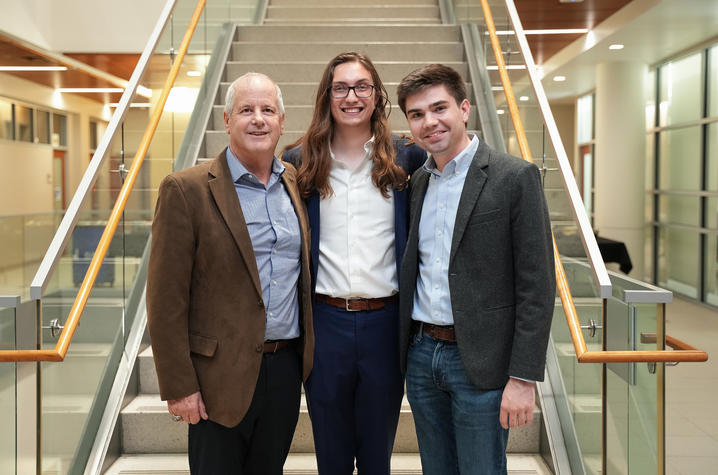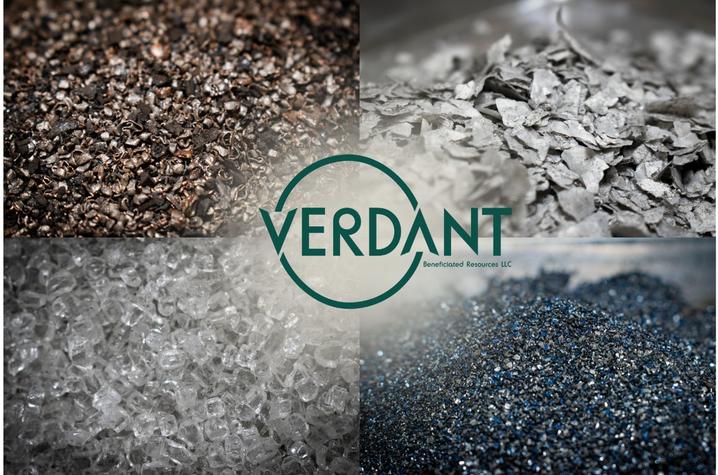New UK startup seeks to turn US trash into Kentucky treasure
LEXINGTON, Ky. (Sept. 14, 2023) — Three members of the University of Kentucky family have launched an ambitious new startup company that they hope will build upon Kentucky’s proud energy legacy.
Jack Groppo, Zebulon Hart and Lucas Bertucci are co-founders of Verdant Beneficiated Resources, a critical materials recovery company. Their mission: Turn the millions of tons of refuse generated across the nation each year, including electronics waste, into a new Kentucky industry.
Verdant Beneficiated Resources spins out of industrial waste utilization and electronics recycling research and development taking place between the UK Center for Applied Energy Research (CAER) and the Department of Mining Engineering in the UK Stanley and Karen Pigman College of Engineering.
“As a nation, we are constantly throwing out scrap that is rich in all sorts of minerals and metals,” said Groppo, Ph.D., a professor and director of undergraduate studies in the Department of Mining Engineering as well as a CAER researcher. “We are literally throwing out things like cobalt, zinc, gold, lithium and silver.
“There is a lot of truth to the idea that one man’s trash is another’s treasure. Our work at CAER has demonstrated that reality for decades,” said Groppo, who has built a career on deploying novel processes that enable the beneficial utilization of industrial waste.
“When you look at the various things that power our lives, homes and workplaces, they are filled with important minerals and metals that we will continue to need,” said Hart, a Mt. Sterling, Kentucky, native who holds a bachelor’s and master’s degree from the Department of Mining Engineering and who has broad industry experience in the electric power and mining sectors. His master’s thesis focused on the recovery of base and precious metals from end-of-life consumer electronics.
“For the most part, we don’t do anything with these end-of-life items,” explained Hart. “We remove batteries from some of these products but the rest of it ends up in a landfill or we ship it to another country where it becomes their problem.”
Verdant Beneficiated Resources is trying to change that narrative. The team believes their work can develop into a profitable, thriving Kentucky business — but the company has a higher purpose.
“We strongly believe that successful sustainability stems from the intersection of groundbreaking research and ethical entrepreneurship,” said Bertucci, a 2023 UK chemical engineering and Lewis Honors College graduate from Louisville, Kentucky. “Sure, we hope to commercialize this technology into a successful Kentucky business. But our primary motivation comes from believing that this is the right thing to do for industry, our communities and future generations. We have identified a legitimate unmet need and seek to serve that need.”
The first waste product the Verdant team is looking to process is solar panels. Though businesses and individuals have been installing solar panels at record rates across the nation, there is currently no common plan for end-of-life solar panels. Most panels, upwards of 90 percent, are not currently being recycled and usually end up in a landfill, a practice that has the potential to introduce harmful materials into the environment.
By 2050, it is estimated that 60-78 million tons of photovoltaic (PV) waste will be generated. Those end-of-life solar panels would contain $15 billion worth of recyclable material — glass, plastics and metals. If recycled, those materials could produce 2 billion new PV panels.
"One goal would be to enable a truly circularized value chain," said Hart. "Take the end-of-life PV modules, recycle them and then integrate the recovered materials into new value chains, potentially that of new PV modules."
Verdant’s solar PV recycling technology implements novel green processing, maximizing the yield of recovered materials while minimizing potential environmental impact. The success of their developments has earned their research recognition on a state and national level from organizations including the American Institute of Chemical Engineers.
Verdant sees itself as an energy transition materials company. Numerous critical materials and metals will be needed for electric vehicles, batteries and energy storage, and, of course, solar panels.
“We know two things for certain: The global appetite for accessible energy is growing and the critical material intensity of emerging energy technologies is often orders of magnitude greater than legacy alternatives,” said Hart. “These two factors point to a future demand for these materials that is unparalleled in history.”
Hart believes this reality is, in part, where Verdant will find its niche.
“Secondary-source materials, as opposed to newly mined materials, will comprise an increasing percentage of the raw material feedstock of technology supply chains of the future,” Hart said. “We are building Verdant to address this specific need.”
Verdant is currently positioned as an early-comer in a rapidly developing high-demand market for critical materials extracted from secondary sources.
“Our model is to be resource inclusive, extracting critical materials from available, enriched and previously neglected resources, whatever the resource may be,” Groppo said. “It just so happens that, at present, that neglected resource is e-waste. However, our capabilities are broad and flexible enough that we can — and will — pivot to address new resources as they emerge.”
The trio is in the process of patenting intellectual property generated in UK laboratories.
Ultimately, this is a story born out of collaboration, education and undergraduate research. Groppo served as an undergraduate research mentor and, later, a graduate advisor for Hart. Hart served as a student mentor for Bertucci when he first began his undergraduate research career at UK.
This partnership really took off when Bertucci was named UK’s first Lee T. Todd, Jr. Student Innovation Scholarship recipient in the summer of 2022. That scholarship program has a unique approach to undergraduate research. Not only do students have the chance to conduct their own research project, but the Todd Scholarship program also pairs students with entrepreneurial mentors and opportunities.
“We owe a great deal of this to the Todd Scholarship program and the example that Dr. Lee Todd has set,” said Bertucci. “The goal of the scholarship is to encourage students to develop their own research projects and work on those projects in a collaborative environment. But it also seeks to encourage students to take those ideas out of the laboratory and into the marketplace. That motivation has been there since the very beginning, and we are excited to be taking this step with our startup company.”
CAER Director Rodney Andrews said the Verdant story of partnership and innovation is both encouraging and inspiring.
“When we invest in creative and talented people and encourage them to attack our toughest problems, anything is possible,” said Andrews. “What excites me about Verdant and this project is how it touches upon every aspect of UK’s land-grant mission — education, research and service. I am proud of Jack, Zeb and Lucas and look forward to seeing what they accomplish next.”
You can watch the full interview with Bertucci and Lee T. Todd Jr., online here.


As the state’s flagship, land-grant institution, the University of Kentucky exists to advance the Commonwealth. We do that by preparing the next generation of leaders — placing students at the heart of everything we do — and transforming the lives of Kentuckians through education, research and creative work, service and health care. We pride ourselves on being a catalyst for breakthroughs and a force for healing, a place where ingenuity unfolds. It's all made possible by our people — visionaries, disruptors and pioneers — who make up 200 academic programs, a $476.5 million research and development enterprise and a world-class medical center, all on one campus.




